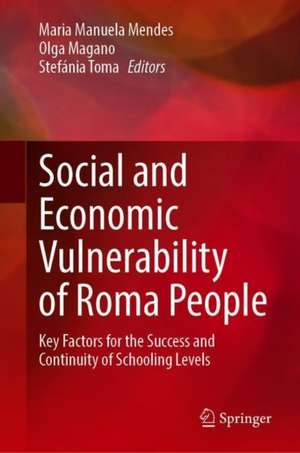Social and Economic Vulnerability of Roma People: Key Factors for the Success and Continuity of Schooling Levels
Editat de Maria Manuela Mendes, Olga Magano, Stefánia Tomaen Limba Engleză Hardback – 9 feb 2021
Preț: 394.51 lei
Nou
Puncte Express: 592
Preț estimativ în valută:
75.49€ • 79.08$ • 62.56£
75.49€ • 79.08$ • 62.56£
Carte tipărită la comandă
Livrare economică 09-23 aprilie
Preluare comenzi: 021 569.72.76
Specificații
ISBN-13: 9783030525873
ISBN-10: 3030525872
Ilustrații: XXI, 253 p. 15 illus.
Dimensiuni: 155 x 235 mm
Greutate: 0.57 kg
Ediția:1st ed. 2021
Editura: Springer International Publishing
Colecția Springer
Locul publicării:Cham, Switzerland
ISBN-10: 3030525872
Ilustrații: XXI, 253 p. 15 illus.
Dimensiuni: 155 x 235 mm
Greutate: 0.57 kg
Ediția:1st ed. 2021
Editura: Springer International Publishing
Colecția Springer
Locul publicării:Cham, Switzerland
Cuprins
Introduction.- Part I: EDUCATION POLICIES, INCLUSION AND EXCLUSION.- Chapter 1. Inclusion or exclusion: UK education policy and Roma pupils (Carol Rogers).- Chapter 2. Ciganos, families and social policies in Portugal: what has changed in the Ciganos attitude towards school? (Maria Manuela Mendes and Olga Magano).- Chapter 3. Segregated schools, “slow minds” and “must be done jobs” – experiences about formal education and labour market in a Roma community in Romania (Plainer Zsuzsa).- Chapter 4. School, languages and power in pretend play of Romani children (Pavel Kubaník).- Chapter 5. From “Unsettled Fortune-tellers” to Socialist Workers: Education Policies and Roma in Early Soviet Union (Jekatyerina Dunajeva).- Chapter 6. Education of Roma and educational resilience in Hungary (Attila Papp Z and Eszter Neumann).- Part II: OBSTACLES AND KEY FACTORS FOR THE CONTINUITY OF EDUCATION.- Chapter 7. The multiple stories in Finnish Roma schooling (Marko Stenroos and Jenni Helakorpi).- Chapter 8. Counteracting the Schools’ Demon: Local social changes and their effects on the participation of Roma children in school education (Stefánia Toma).- Chapter 9. Key factors to educational continuity and success of Ciganos in Portugal (Olga Magano and Maria Manuela Mendes).- Chapter 10. Roma at School: A Look at the Past and the Present. The Case of Portugal (Lurdes Nicolau).- Part III: EDUCATION STRATEGIES: SUCCESS AND SOCIAL MOBILITY VS. REPRODUCTION OF INEQUALITIES.- Chapter 11. Duality of Humans: The Wish to Learn and Not to Learn (Andria D. Timmer and Máté Erős).- Chapter 12. The Influence of Social Capital on the Educational Attainment of Roma Persons: Evidence from a Qualitative Study in Romania (Theofild-Andrei Lazar and Elena-Loreni Baci).- Chapter 13. Roma Population in the Spanish Education System: Identifying Explanatory Frameworks and Research Gaps (Francisco Javier Ullán de la Rosa and Hugo García Andreu).- Chapter 14. “I felt I arrived home”: The minority trajectory of mobility for first-in-family Hungarian Roma graduates (Judit Durst and Ábel Bereményi).- Index.
Notă biografică
Maria Manuela Mendes is a sociologist and Assistant Professor at the Faculty of Architecture, University of Lisbon (FAUL). She received her PhD in Social Sciences from the Institute of Social Sciences, University of Lisbon in 2007 with a master degree (1997) and a degree in Sociology from Oporto University, 1992. She is a fellow researcher in Centre for Research and Studies in Sociology Institute University of Lisbon (CIES-IUL) and a member at the Centre for Research Architecture, Urban Planning and Design (CIAUD, FAUL) and the Institute of Sociology Faculty of Arts of Porto (ISFLUP). Her research focuses on ethnicity, immigration, Roma/Ciganos, city and diversity, social and spatial exclusion, relocation and disqualified territories.
Olga Magano is a Professor at the Open University and a researcher at the Centre for Research and Studies in Sociology, University Institute of Lisbon (CIÊNCIA-IUL). Her academic and research interests lie in sociology and around the issues of integration and social exclusion of social and cultural minorities, especially individuals of gypsy origin. She intends to continue her research in the field of intercultural relations and identity formation as a dynamic social process, particularly among gypsies.
Stefánia Toma is a researcher at the Romanian Institute for Research on National Minorities (ISPMN). Her areas of interests include the anthropology of ethnic minorities and ethnic relations, economic anthropology and sociology of education. Between 2006 and 2017 she was a researcher and a coordinator in a number of international research projects related to the international migration of Romanian Roma people.
Textul de pe ultima copertă
This open access volume provides an understanding of the different aspects of success, school continuity and social mobility among European Roma, including the motives justifying the high rates of school dropout and failure among this group. It offers a critical and reflexive perspective about social reality from a multidisciplinary and transversal point of view, sharing knowledge and practices in different countries about the articulations between Roma families, individuals, school and public policies. Over time, there has been an increase in the educational attainment of European citizens, but there are still persistent inequalities between Roma and non-Roma, including gender inequalities, which greatly affect Roma women. The volume explores the issue of Roma education and includes chapters from Western European, South and Central and Eastern European researchers using different theoretical and methodological perspectives. The intersection of this diversity and plurality of standpoints makes possible to obtain a comprehensive view on the education and schooling of European Roma.
Caracteristici
Provides an understanding of the different aspects of success, school continuity and social mobility among European Roma Discusses the inequalities between Roma and non-Roma education from theoretical, methodological and empirical perspectives Explores the issue of Roma education and includes chapters from Western European, South and Central and Eastern European researchers This book is open access, which means that you have free and unlimited access.
